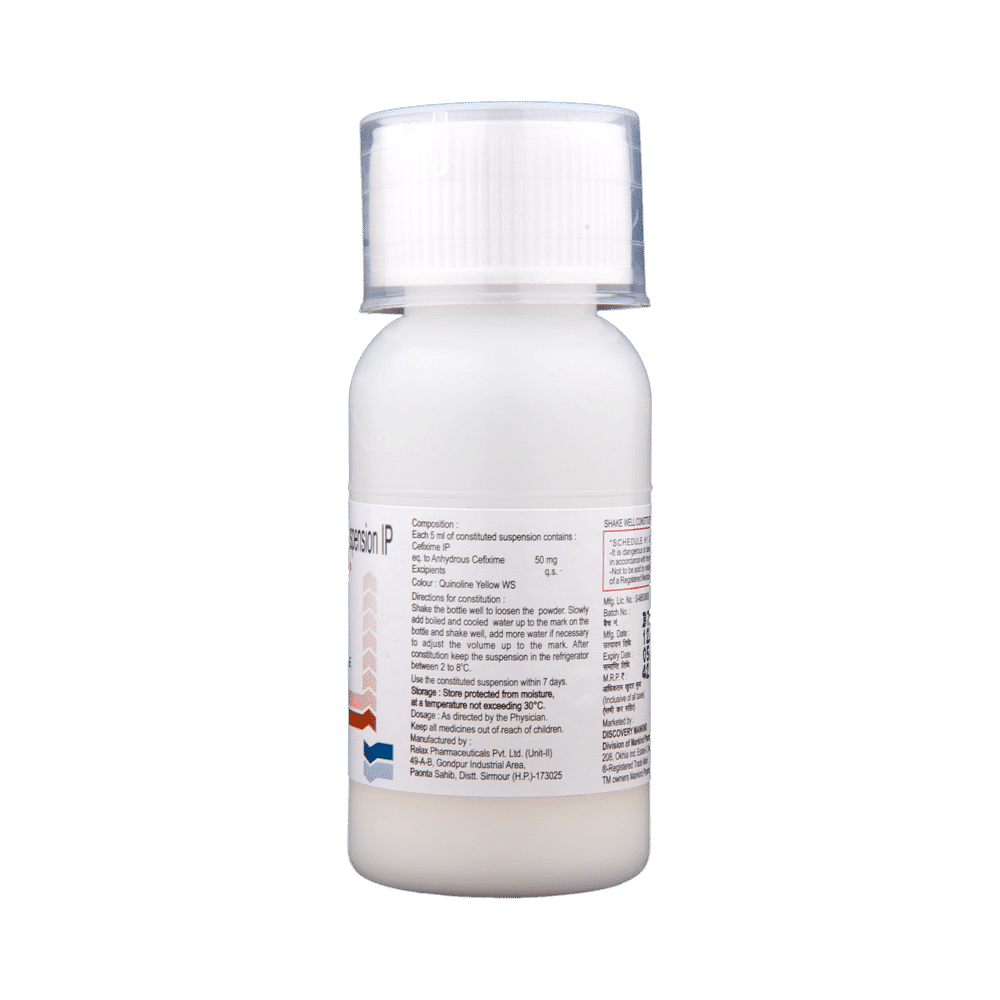
Ralicef Dry Syrup
Manufacturer
Astra Labs
Salt Composition
Cefixime (50mg)
Key Information
Short Description
Ralicef Dry Syrup is an antibiotic medicine used to treat a wide range of bacterial infections in children, including ear, eye, nose, throat, lung, skin, gastrointestinal tract, and urinary tract infections.
Dosage Form
Oral Suspension
Introduction
Ralicef Dry Syrup is an antibiotic medicine commonly given to children to treat a wide range of bacterial infections. It can also be used in treating uncomplicated typhoid fever in children and adolescents. It is essential to complete the entire course of antibiotics to avoid the bacteria multiplying again, becoming resistant, or causing another infection.
Directions for Use
Give this medicine with food to avoid an upset stomach. Encourage your child to drink plenty of water in case diarrhea develops as a side effect.
Safety Information
Side Effects
No common side effects listed
How it works
Ralicef Dry Syrup is an antibiotic that works by preventing the formation of the bacterial protective covering (cell wall) which is essential for the survival of the bacteria. By doing so, this medicine stops the infection-causing bacteria from growing further and prevents the infection from spreading without making them resistant to further treatment.
Quick Tips
Your child must complete the entire course of antibiotics Give this medicine with food to avoid an upset stomach Encourage your child to drink plenty of water in case diarrhea develops as a side effect Conditions like common cold and flu are caused by viruses. Never use this medicine for such conditions Only give Ralicef Dry Syrup to your child for their current infection. Never save medicine for future illnesses
Related Medicines

Mahacef Dry Syrup

Niricef Dry Syrup

Ikva-Cef Dry Syrup

Cefirest Dry Syrup

Lexim Oral Suspension

Drexime 50 Oral Suspension

Ourxime 50 Dry Syrup

Ixeem 50mg Oral Suspension

Yetacef 50 Dry Syrup

Tanixime 50 Dry Syrup
Frequently asked questions
What if I accidentally give too much Ralicef Dry Syrup to my child?
Taking an extra dose of Ralicef Dry Syrup is unlikely to be harmful, however, it's important to contact a doctor immediately if you believe your child has taken too much. Overdose can lead to unwanted side effects and might worsen their condition.
Are there any serious possible side effects of Ralicef Dry Syrup?
Serious side effects, like persistent vomiting, kidney damage, allergies, diarrhea, and severe gastrointestinal infections can occur. Always consult your child's doctor in such a situation.
Can I give my child other medicines at the same time as Ralicef Dry Syrup?
Ralicef Dry Syrup may interact with other medications or substances, so it is crucial to discuss your child's medication list with their doctor before administering any new medication. Additionally, consult your child's doctor regarding any necessary adjustments to the dosage.
Can I get my child vaccinated while on treatment with Ralicef Dry Syrup?
Antibiotics usually do not interfere with vaccines or cause a negative reaction in children who have recently received one. However, children taking antibiotics should avoid getting vaccinated until their illness has cleared up. Once your child feels better, the vaccine can be administered.
Which lab tests may my child undergo on a long-term basis while taking Ralicef Dry Syrup?
Doctors might recommend regular kidney function and liver function tests during long-term use of Ralicef Dry Syrup to monitor your child's condition.
My child's nose mucus is yellow-green. Is this a sign of a bacterial infection?
Yellow or green mucus in the nose is not automatically indicative of needing antibiotics. During a common cold, mucus changes color and thickens. Symptoms usually last 7 to 10 days.
Does a common cold caused by viruses always lead to a secondary bacterial infection? When should I start an antibiotic to prevent infection?
In most cases, bacterial infections do not develop after viral infections. Antibiotics are only needed in case of severe symptoms or complications and must be prescribed and administered by your child's doctor.
Can Ralicef Dry Syrup impact my child’s digestive system?
Children often have sensitive stomachs, leading to stomach upsets while taking antibiotics. Antibiotics may also disrupt the good bacteria in their gut, potentially causing a rise in other infections. If your child develops diarrhea during treatment with Ralicef Dry Syrup, it's best to contact their doctor for guidance on adjusting the dosage.
Can Ralicef Dry Syrup lead to bacterial resistance in my child?
Yes, improper use and over-use of Ralicef Dry Syrup can contribute to bacterial resistance. Bacteria that are resistant to antibiotics, meaning they're no longer killed by the medication, could result in reinfection.
How long should I take Ralicef Dry Syrup?
Ralicef Dry Syrup is usually prescribed for 7-14 days. It is essential to follow your doctor's instructions regarding the duration of treatment.


